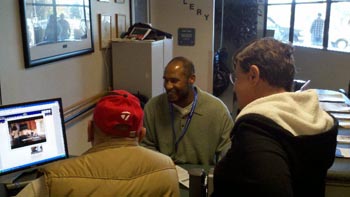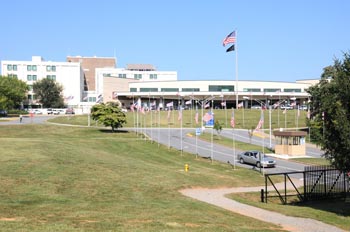Medical Home Care for Veterans
 |
| Volunteer Russell Johnson helps enroll veterans in the My HealtheVet program. Photo courtesy of Asheville VA Medical Center. |
by Moe White
One of the more innovative programs designed to help out veterans and local residents is the Home-based Medical Foster Care Program, operated out of the Charles George VA Medical Center in East Asheville.
The Home-based Medical Foster Care Program offers an alternative to veterans who can no longer live independently but do not want to enter a nursing home.
According to Susan McKinnish, who directs the Asheville program, the Medical Foster Home program matches disabled vets with non-family caregivers who share their homes to provide ongoing care. The caregiver makes a long-term commitment to the veteran, so that even as the veteran ages and his or her needs change, he or she can avoid placement in a nursing home or hospitalization while enjoying a more home-like environment.
The caregiver, meanwhile, earns income at home by caring for the
disabled veteran; the veteran uses his or her benefits to pay the
caregiver according to the level of care required. The caregiver also
receives on-going training and support from the MFH coordinator and a
home care team.
A caregiver must be at least 21 years old and comply with the
training requirements needed for the specific needs of the veteran. The
caregiver must own or rent his or her own home, which must have a vacant
room accessible to the veteran and pass a VA fire and safety
inspection.
In exchange, the caregiver provides 24-hour care for the veteran, which
entails: protection of the veteran’s privacy and confidentiality;
medication management; assistance with personal care; nutritious meals;
activities with family and the larger community; and emotional and
social support.
 |
| Asheville’s VA Medical Center |
In addition to inspecting and approving homes, the VA provides technical
support regarding requirement and home modifications, education and
training for caregivers, and ongoing support to both the veteran and the
caregiver as needs change. The VA ensures that the veteran and
caregiver are well matched and monitors their situation to ensure
continued satisfaction by both parties. The VA also provides appropriate
primary medical care in the home through an interdisciplinary care
team.
The application process is rigorous, with a twenty-one page application
form and requirements for fingerprinting and thorough inspection of
homes for safety. But anyone who is good at caregiving and wants to give
back to our nation’s vets, providing home-based care for a veteran is
rewarding and fulfilling. The veteran gets a home and a quasi-family,
and the caregiver both puts extra space in his or her home to good use
while earning a reasonable living.
For more information about the Medical Foster Care program, contact
Susan McKinnish at the Charles George VA Medical Center at (828)
298-7911, x 15834, or








